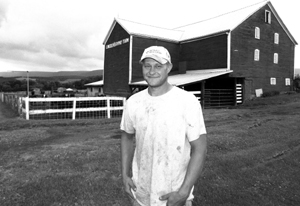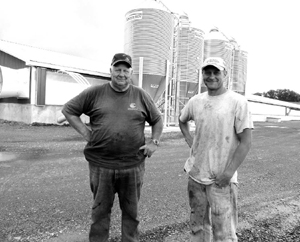

Like many farms across the country, Lincoln Highway Farm, about a mile west of Schellsburg, has had to diversify to continue operating as a successful enterprise.
Through local and regional collaborations, Lincoln Highway, owned and operated by Carl Egolf Jr. and son, Adam, has continued to make farming a business that pays.
Lincoln Highway was established more than 130 years ago by Abraham Egolf, mostly as an orchard, with a packing house, Carl Egolf said.
He and his father entered into a partnership in the 1980s and in the 1990s, Carl Jr. took over full-time. Now he and his son, Adam, are partners.
It has been primarily a beef finishing and grain farm. The farm finishes out about 100 black Angus crossbreds each year. There are also about 110 cow-calf pairs at the farm along Route 30.
The cattle are shipped to Weigel’s Buying Station in Somerset County and then on to Cargill’s.
The Egolfs also harvest grains — soybeans, corn, hay and a small amount of oats — on about 1,110 acres.
But then, a new operation south of Everett, Country View Family Farms, approached them about starting a hog operation that would give them some added income: They could finish hogs on contract and be guaranteed a monthly check.
Carl, 60, said he’s never had that luxury. “I’ve never had a monthly income,” he said.
Country View provides the feed and the pigs they need fattened. The family owned company that raises pork across Pennsylvania and in neighboring states invested more than $13 million in a sow operation.
He and Adam hashed it out but decided to commit to building a barn that measures 80-by-500 feet plus a manure storage facility.
“We’re going to run this five years and see how it goes,” Carl said.
“All we do is manage the barn. We own the barn, they own the pigs, the feed and they take them to their processing facility,” Carl said.
“It’s pretty much an integrated company. We have a set contract and we get aid so much a month.”
He and Adam launched the hog operation last November after winding through the fairly complex permit process that they joked involved “just about everybody.”
The Egolf’s hog operation is considered a concentrated feed operation that requires a National Pollutant Discharge Elimination System permit that contains limits on what pollutants can be discharged.
But unlike other largescale operations, the Egolfs didn’t have any blowback from neighbors about the potential smell or application of the manure.
The Egolf’s barn is off Turner Camp Road, on a piece of the farm that’s been in the family for generations. The knoll the barn is on overlooks the valley west of Schellsburg.
“It’s back out of the way. No one sees it,” Carl said.
That’s why they built the barn where they did and took the contract, Adam said. It didn’t bother neighbors, and the Egolfs have enough acreage to take all the manure and use it to fertilize their fields. In some cases, concentrated operations have to export manure because the contractor himself doesn’t have the ground to properly apply the manure.
The 4,800-head barn is on its second turn. The first set of finished hogs already were trucked out. Carl said they can do three turns a year.
It’s also not as labor intensive as other parts of farming. Adam said he spends three or four hours a day at the hog barn.
That allows him time to help handle the fields and the beef.
The beef is still an important part of the operation.
The Egolfs get paid for the hanging weight of the cattle and the grade. “It works really well for us. We know how our cattle graze and we can usually get them into certified Angus beef.”
The hog operation has given them stabilization so the farm, which gained Century Farm status in the 1980s and is part of the Lincoln Highway tour, can remain a vibrant part of the county’s agricultural scene.
In addition to operating the swine facility, the beef barn, the crops, they maintain their own equipment to keep up their family farm.
It’s 14 or 15 hours a day, Carl said. “We’re hoping (the hog contract) keeps the farm surviving.
“It’s one of those things, if you don’t like it, you better not be in it,” Carl said of farming. “It’s not for everybody.”
Story by Elizabeth Coyle, The Bedford Gazette
